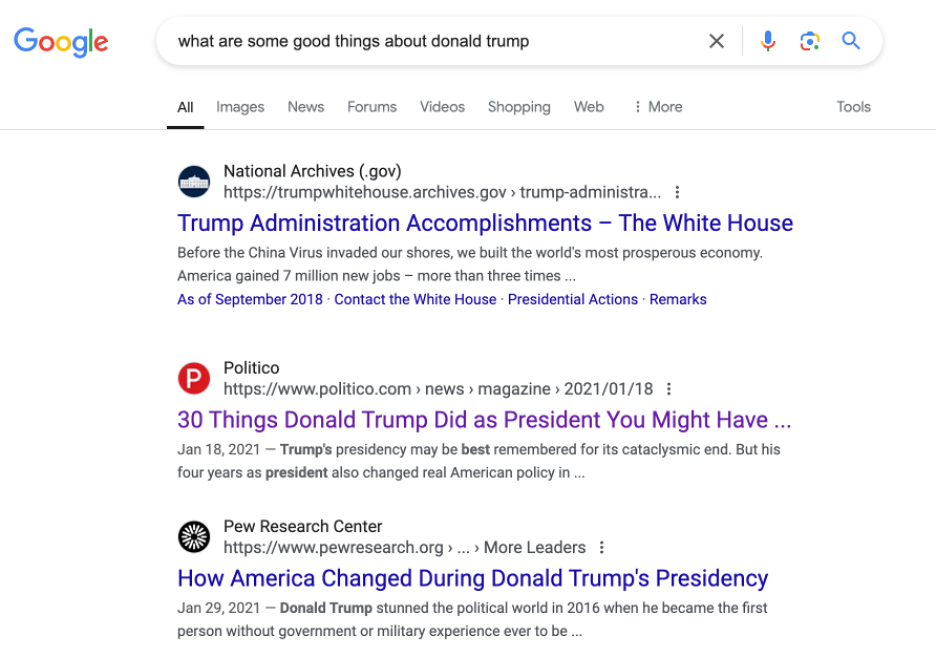We support our Publishers and Content Creators. You can view this story on their website by CLICKING HERE.
When Google launched in the late 1990s, it quickly overtook the market for search engines. Its proprietary method of indexing led users to results they were actually looking for rather than producing the hodgepodge of results offered by other search engines of the time. Within just a few years, it was dominating the market. Today, it is a money-printing machine.
It’s also increasingly horrible at the core mission that produced such success. The company’s leadership may have realized early on that to dominate they needed to maximize the marketing angle of search, but over time that side of the business — the one that produces revenue — swallowed the informative results that drove the search engine’s success.
Now, Google’s true product, its users, are drowning in a sea of partisan slop and sponsored content rather than getting the results we’re looking for when we take to the World Wide Web. By doing so, Google is making it pointless for us to continue to allow ourselves to be the product.
Let’s say you have an artistic daughter who wants some oil paints for Christmas, but you’re unsure about which brand to buy or even what the definition of oil paint is. You head over to Google and type in “oil paint.” Is your first result a definition or even the Wikipedia page? Nope, it’s ads. You have to scroll to get to Wikipedia.

Similarly, you might find yourself hungry while on the road, so someone in the car Googles “restaurants near me.” There was a time when this feature was useful. Now, the restaurants are paying to play and the resulting results are ridiculously skewed. While I’m not going to dox myself here with screenshots of the results I get when I Google “restaurants near me” while sitting in my house, suffice it to say that the top results aren’t necessarily the closest, or even highest-rated, eateries. Some that I know are there — because I live in this area! — aren’t even listed.
Granted, these aren’t extremely pressing issues. People researched oil paints and found places to eat for decades upon decades without the assistance of the internet. What is a bigger deal is how nakedly partisan Google has become. Former President Trump has even complained about it, taking time to call CEO Sundar Pichai to point out the problem.
Naturally, his complaints were downplayed, but your Google search is supposedly tailored to your interests. As I am not suffering from Trump Derangement Syndrome and have written positively about him (and used Google to find info for such articles), my results should be reflective of that. Instead, I get the latest anti-Trump bromides of the day.

The same search on another day was slightly different, including some horse race articles.

When I clicked on the “more news” section, though …


At least those results are timely, if not all actually news, but what if the search is expanded to “What are some good things about Donald Trump?”

Points to Google for pointing to the National Archives in the first hit, I suppose. The second, though, is largely a list of things writers at Politico deem negative with the “upshot” being that President Biden was going to undo them. What if the search is changed to “Donald Trump achievements?”

Okay, Google really likes that Politico piece and has deemed anything Donald Trump did ever before becoming president irrelevant, but what about “Donald Trump achievements as president?” Surely, its algorithm can pop up a few pieces about the economy or immigration or Trump helping grow The Washington Post’s subscriber base so as to help keep democracy from dying in darkness or whatever.

Super cool, super helpful, super neutral. Now, let’s check in on Kamala Harris.


Well, that’s weird. Whereas Trump’s campaign website is pushed down the page when his name is Googled, beneath mostly negative opinion pieces, Harris’ website is right there, with the “top stories” below it. I’m sure that’s just how search engines work, with no biases programmed in whatsoever. The completely neutral algorithm just happens to display the info the campaign would prefer to be displayed first at the top of the page, with the top stories about the candidate being answers to questions people might have about her, as well as a hit piece on Bret Baier thrown in for good measure.
This isn’t just about the election, though, but also about the changing nature between users — again, the product — and the online services we allow ourselves to be pimped out for. The disparities between the results for Trump and Harris simply highlight how stark the problem is.
Whether it’s Google or Facebook or Instagram, the initial premise of expanding easy access to information and apprising us of stories we might have otherwise missed has been largely destroyed. Google and Meta show us what they want us to see, not what we signed up to see, and it’s starting to turn people off. Maybe that’s a good thing, because most people need to spend more time in the real world. But when we’re trying to find a restaurant or information about voting or see pictures of a friend’s new landscaping or figure out how to get Elmer’s glue off the hardwood floors, burying those things under a mountain of nonsense makes us more likely to tune out.
Which is probably not just a good thing but a great thing — but initially the internet and social media were supposed to be about connecting us, about decreasing barriers to information. It would be nice if our tech overlords could remember what their initial goals were — in Google’s case, it was “to organize the world’s information and make it universally accessible and useful” — and return to those ideals instead of pushing us toward full “Idiocracy.”
I’m not holding my breath waiting for that to happen, though, particularly as Google itself deems such queries unworthy of answering.


 Conservative
Conservative  Search
Search Trending
Trending Current News
Current News 





